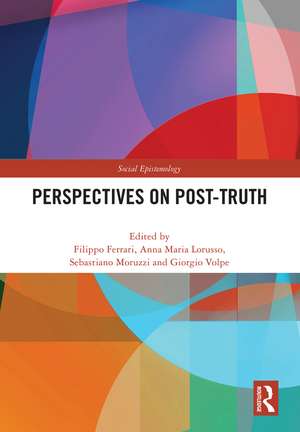Perspectives on Post-Truth
Editat de Filippo Ferrari, Anna Lorusso, Sebastiano Moruzzi, Giorgio Volpeen Limba Engleză Hardback – 30 aug 2024
‘Post-truth’ denotes a cluster of phenomena that pose significant epistemic and societal challenges, including the proliferation of confirmation bias, denial of scientific findings, reinforcement of beliefs within echo chambers, and rampant spread of misinformation, conspiracy theories, and fake news—most notably via social media platforms. These phenomena have tangible effects, manifesting in a societal schism and contributing to public opinion polarization. Trust in scientific institutions and expertise is eroding, and the fragmentation of public opinion in opposed ‘epistemic tribes’ threatens the very foundations of democratic societies, undermining the role of scientific bodies in public discourse and policy-making. Drawing on diverse methodologies, theoretical frameworks, and expert insights, the contributions to this book scrutinize core post-truth phenomena through a multi-disciplinary lens and construct a nuanced understanding and an effective toolkit to confront the challenges posed to our social fabric.
Tailored for a diverse readership, including scholars in social and traditional epistemology, semiotics, and related fields, as well as an informed general audience, this volume will be particularly relevant for individuals interested in fostering their understanding of phenomena such as post-truth, science denialism, societal polarization, and their impact on democratic processes and institutions. It was originally published as a special issue of Social Epistemology.
Preț: 943.31 lei
Preț vechi: 1150.38 lei
-18% Nou
Puncte Express: 1415
Preț estimativ în valută:
180.51€ • 189.33$ • 150.27£
180.51€ • 189.33$ • 150.27£
Carte tipărită la comandă
Livrare economică 01-15 aprilie
Preluare comenzi: 021 569.72.76
Specificații
ISBN-13: 9781032826042
ISBN-10: 1032826045
Pagini: 120
Dimensiuni: 178 x 254 mm
Greutate: 0.43 kg
Ediția:1
Editura: Taylor & Francis
Colecția Routledge
Locul publicării:Oxford, United Kingdom
ISBN-10: 1032826045
Pagini: 120
Dimensiuni: 178 x 254 mm
Greutate: 0.43 kg
Ediția:1
Editura: Taylor & Francis
Colecția Routledge
Locul publicării:Oxford, United Kingdom
Public țintă
Postgraduate, Undergraduate Advanced, and Undergraduate CoreCuprins
Introduction: Perspectives on Post-Truth 1. The Origins of the Alleged Correlation between Vaccines and Autism: A Semiotic Approach 2. Why Post-Truth Cannot Be Our Epistemological Compass 3. Post-Enquiry and Disagreement: A Socio-Epistemological Model of the Normative Significance of Disagreement Between Scientists and Denialists 4. Epistemic Bunkers 5. The Possibility of Epistemic Nudging 6. Fake News as Discursive Genre: Between Hermetic Semiosis and Gossip 7. Consuming Fake News: Can We Do Any Better? 8. The Epistemological Compass and the (Post)Truth about Objectivity
Notă biografică
Filippo Ferrari is Assistant Professor of Philosophy at the University of Bologna. He received his PhD from the University of Aberdeen and held postdocs positions in the UK, Germany, and Italy. Ferrari is involved with several international research networks and has published extensively on a variety of topics, including two books on truth.
Anna Maria Lorusso is Full Professor in the Department of Arts of Bologna University, where she teaches Semiotics, Semiotics of Culture and Analysis of Information. Her research is focused on the Semiotics of culture, with two main fields of research: logic of information (post-truth, fake news etc..) and cultural memory.
Sebastiano Moruzzi is Associate Professor at the University of Bologna. His main research interests concern relativism, the nature of disagreement, ontological theories, theories of truth, theories of vagueness. Moruzzi is also involved in research concerning didactic innovation and he is very active in doing philosophy with children.
Giorgio Volpe is Associate Professor of Philosophy at the University of Bologna. His research focuses on issues in epistemology, philosophy of language, and philosophy of logic, particularly where those areas intersect. In addition to numerous journal articles, he has written two books on truth.
Anna Maria Lorusso is Full Professor in the Department of Arts of Bologna University, where she teaches Semiotics, Semiotics of Culture and Analysis of Information. Her research is focused on the Semiotics of culture, with two main fields of research: logic of information (post-truth, fake news etc..) and cultural memory.
Sebastiano Moruzzi is Associate Professor at the University of Bologna. His main research interests concern relativism, the nature of disagreement, ontological theories, theories of truth, theories of vagueness. Moruzzi is also involved in research concerning didactic innovation and he is very active in doing philosophy with children.
Giorgio Volpe is Associate Professor of Philosophy at the University of Bologna. His research focuses on issues in epistemology, philosophy of language, and philosophy of logic, particularly where those areas intersect. In addition to numerous journal articles, he has written two books on truth.
Descriere
This volume tackles an array of complex and interrelated phenomena which are usually referred to as the post-truth condition – from confirmation bias to science denialism, misinformation, and the rise of polarized ‘epistemic tribes’ on social media. It was originally published as a special issue of Social Epistemology.
